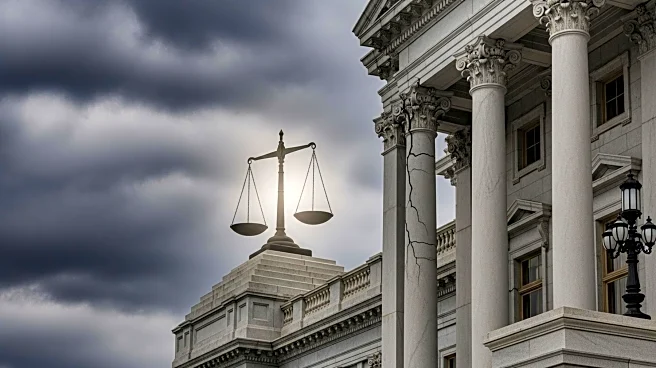What is the story about?
What's Happening?
The U.S. government shutdown has entered its fifth day as Republican and Democratic lawmakers remain at an impasse over budget negotiations. The shutdown stems from disagreements over health insurance subsidies and spending levels. President Trump has threatened permanent layoffs of federal workers if the government remains closed, attributing the blame to Democrats. The shutdown occurs amidst economic uncertainty, with slowed hiring and elevated inflation. House Democratic leader Hakeem Jeffries criticized the lack of negotiations since a meeting with Republican leaders, while President Trump expressed confidence in cutting costs during the shutdown. The administration has withheld congressionally approved spending, complicating budget compromises. A Senate vote to advance a Republican bill to reopen the government failed to achieve the necessary votes to end a filibuster.
Why It's Important?
The ongoing government shutdown has significant implications for federal workers and the broader U.S. economy. With thousands of government employees facing potential layoffs, the shutdown threatens to disrupt public services and infrastructure projects, particularly in Democratic areas. The economic impact is compounded by existing challenges such as inflation and import taxes, which have already affected business confidence. The political stalemate highlights deep divisions between parties, with Democrats pushing for health care subsidies and Republicans seeking to maintain current spending levels. The situation underscores the difficulty in achieving bipartisan cooperation on budgetary issues, which could have long-term consequences for fiscal policy and economic stability.
What's Next?
As the shutdown continues, the Senate is expected to vote again on Monday, offering another opportunity for Democrats to reconsider their stance. However, the lack of productive conversations between parties suggests that a resolution may not be imminent. The House's decision to close for legislative business next week could pressure the Senate to work with the House-passed funding bill. The administration's strategy of withholding spending and threatening layoffs may further complicate negotiations. Stakeholders, including political leaders and federal employees, are likely to continue advocating for a resolution to prevent further economic disruption and job losses.
Beyond the Headlines
The shutdown raises ethical concerns about the use of government workers as leverage in budget negotiations. The administration's approach to withholding congressionally approved spending challenges the traditional balance of power between the executive and legislative branches. Additionally, the use of internet memes and deepfake videos in political discourse reflects a shift towards more aggressive and less conventional negotiation tactics. These developments may influence future political strategies and the public's perception of government accountability.















